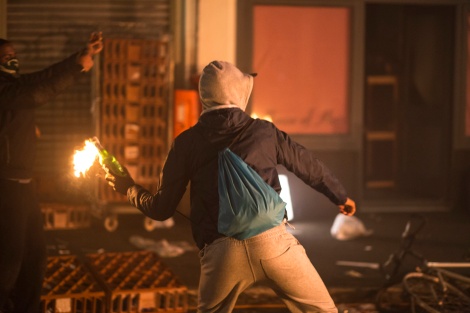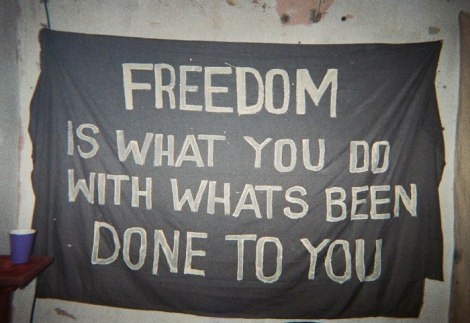Directed and Written by: Jamie Jones
Produced by: Emily Jones, Ross Williams
Starring: Marcus Rutherford, Sophie Kennedy Clark, Sam Gittens, T’Nia Miller, James Atwell
Music by: Lol Hammond
Cinematography by: Albert Salas
Edited by: Agnieska Liggett, Emma Gaffney
Obey received the Best Cinematography in an International Narrative Feature Film prize at the 2018 Tribeca Film Festival.

Courtesy Albert Salas
Like London’s answer to Do the Right Thing, Jamie Jones’s debut feature, Obey, draws connections between systematic abuse of the poor and the inevitable uprising that occurs in response. Driven by social injustice everywhere, and anchored by an absolutely furious performance by the gifted newcomer Marcus Rutherford, this handsome class drama is all but guaranteed to find its release niche following its World Premiere earlier this year at the Tribeca Film Festival.
Rutherford’s was one of the greatest performances at the festival; in the film, he plays Leon, a black 19-year-old living in a turbulent London neighborhood on the cusp of the 2011 riots. Turbulent because Leon’s friends – unable to find work or get effective support from their local social workers – need money so badly that sometimes they rob sitting vehicles. Turbulent because there are spoiled whites squatting in the nearby apartment buildings without paying rent, each of whom gets off easy when caught by the police. Turbulent because the fact of being black in Leon’s neighborhood is like being born with a target on your back.
This quiet young man’s personal life is a mirror for the socioeconomic realities of the area. His mother (T’Nia Miller, in a heartbreaking role) is crippled by alcoholism and the monstrous white lover (James Atwell) she uses for booze and drug money. A college drop-out without work experience, Leon is left to his own devices, attending hedonistic parties like the one where he meets Twiggy (Sophie Kennedy Clark of Nymphomaniac).
Twiggy, an entitled hipster layabout, has stick-and-poke tattoos, a septum piercing, and a penchant for marijuana. You might call her a Manic Pixie Dream Girl – and she is very much a manic personality, veering between Leon’s affections and those of her laughable activist boyfriend (Sam Gittens) – but she’s hardly dreamy. Rather, Twiggy is something of a leech, staying with friends and refusing to pay rent despite (or perhaps because of) the fact that she doesn’t seem to work. Where does she get her money, you wonder?

Sophie Kennedy Clark as “Twiggy” (left) and Marcus Rutherford as “Leon”. Courtesy Albert Salas
Jones’s script offers no revelations about the working-class experience in England, but he astutely observes how people of color live with, and are used by, their wealthier (and paler) neighbors.
In Twiggy, Leon sees something of a sexualized savior: part-mother, part-girlfriend, part-Gandhi. Her brazen house-squatting awakens something in him, driving Leon further from his teenaged apathy and closer to outright hatred of the police, who he foolishly challenges after seeing them beat Twiggy and Anton.
Likewise, Clark – long deserving of a lead role, but landing with a soft thud here – presents a woman hungry for excitement and drama. Her privilege seems both to disgust and to preserve her; while Twiggy romanticizes Leon’s desperation, and perhaps even fetishizes it, the possibility of a carnal relationship carries deep colonial baggage.
The concept of racial fetishism is the shadow subject of Jones’s script, unspoken but implicit in every act of violence perpetrated throughout Obey.
Seeing a white man grab a black woman around the waist, we are entirely unsurprised when he later punches her with vicious abandon. These are not only cinematic clichés, but also realistic ones.
*****
Just as Twiggy lusts for Leon, so too do the riot cops who appear in the film’s final act seem almost to desire the taste of blood.
In this magnificently choreographed sequence, Jones’s direction springs to life, aided by Albert Salas’s expansive wide-shot tableaus. In a lesser film, the riot might have been milked for its action, with showdowns and graphic murders between the cops and the kids. Even Spike Lee made Mookie’s revolt seem kind of…fun.

Courtesy Albert Salas

Courtesy Albert Salas
But Jones is working more in the self-serious tone of Steve McQueen’s Hunger prison scenes, or Kathryn Bigelow’s Detroit, both of which undercut the inherently thrilling aspects of raging violence by suggesting the traumatic consequences it had on the oppressed.
With all due respect to Salas’s artful photography, there is nothing beautiful about the beatings and abuse Jones depicts onscreen. The entire sequence carries with it the reality of black existence in England and across the African diaspora in Europe.
If the preceding 80 minutes can’t quite match these scenes in energy or intensity, it is only because we have been down this narrative road a few times before.
Rutherford, Clark, and Miller all appear at times to be trapped in their characters’ poor choices: the meet-cute at a strobe-filled party; drunken dancing with an abuser; a large object coming through a glass window. All are redundancies in the wider world of film, the commonality of which reduces the actors into narrative mechanisms. The filmmakers would have been wiser to avoid treating their characters in this way.
But this is a debut film, after all, and the wrath conveyed by the ferociously talented cast of Obey could not be felt so vividly without a clear directorial voice. Distributors will no doubt agree – the film begs to be seen by all Americans, as we are in the same throes of racial unrest that besieged the UK back in 2011 and reached their apotheosis in the Brexit vote.
With an increasingly militarized police force and a racist, authoritarian presence leading our own Justice Department, filmmaker Jamie Jones may be called upon for an American remake sooner than he knows.

Courtesy Albert Salas
Editor’s Note: Journalism is hard and criticism often equally so, but we continue unabated our half-decade enterprise of highlighting undervocalized and underexposed voices in cinema, music, comedy, and culture. Spare a dime to help us continue our support for independent mediamakers by making a tax-deductible donation to CineMalin.

Valuable commentary. Thank you and look forward to seeing film (and you again!).
Carol Eisner Eisner Public Relations (310) 413-3991 Mobile/Text
>
LikeLike